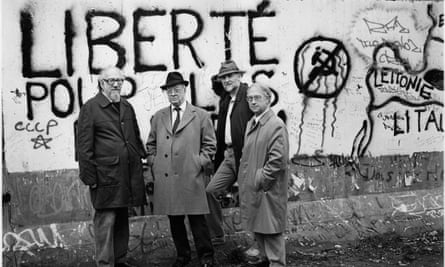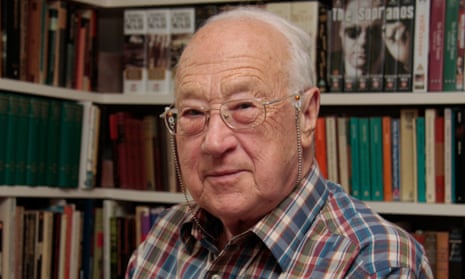As a cub reporter on the Oxford Times in the early 1950s, Anthony Price, who has died aged 90, was asked if he fancied reviewing a book for its sister paper, the Oxford Mail. It was, he was told, “only a children’s book but it’s by a local author”. The local author turned out to be a Prof JRR Tolkien and the book was The Fellowship of the Ring. Price’s career as a reviewer was off to an auspicious start.
He was to specialise in crime fiction, and his reviews in the Oxford Mail made him one of the most highly regarded commentators on, and judges of, the genre, so much so that in 1968 the publisher Livia Gollancz asked him to consider writing a history of the crime novel. Price turned down the offer, feeling it would involve too much work, but added he did have an idea of his own for a novel, if Gollancz might be interested.
They were; and when The Labyrinth Makers was published in 1970, it was to ecstatic reviews (from Edmund Crispin and Marghanita Laski among others) and won the Crime Writers’ Association Silver Dagger award. The book introduced Dr David Audley and Colonel Jack Butler, respectively an academic and a solid military man working for British counter-intelligence, who were to feature in many of Price’s 19 novels over the next 19 years.
Anthony was born in Rickmansworth, Hertfordshire, his parents having recently returned from India where his father, Walter, had been a civil engineer. His mother, Kathleen (nee Lawrence) died when he was seven and he was brought up first by an aunt and then, when his father remarried, a stepmother from whom he was quickly estranged.

He was educated at the King’s school, Canterbury, where he prospered academically and came to the attention of the headteacher, Canon Frederick Shirley. When Anthony’s stepmother wouldn’t pay his last year’s school fees, Shirley’s wife paid and Anthony returned her faith in him by winning a scholarship to Merton College, Oxford.
Oxford had to wait until after national service, 1947-49, first in the Royal Signals, then the Education Corps, where Price achieved the rank of captain. After reading history at Merton he remained in Oxford, where he met Ann Stone, a nurse, and opted for a career in journalism with the Oxford Times, becoming editor in 1975.
While reviewing crime fiction, he became a friend of the literary editor, Brian Aldiss. He treated thrillers with the respect reviewers usually only showed to traditional detective stories and was an enthusiast for the early Bond books of Ian Fleming, though he did add the caveat when reviewing Dr No in 1958 that the villain was 30 years out of date and belonged more to the era of Fu Manchu.
In the 1960s he welcomed the arrival of writers such as Len Deighton, Dick Francis, Gavin Lyall and John le Carré, the last of whom he particularly admired. It was a source of wry amusement that his favourite Le Carré novel, Tinker Tailor Soldier Spy, was pipped to the 1974 Gold Dagger award by his own Other Paths to Glory.
For two decades Price juggled careers as a newspaper editor, book reviewer and author, with Ann acting as his unofficial business manager. The success of his first novel resulted in rapid election in 1971 to the Detection Club, where he met and befriended many of the authors he admired, including Eric Ambler, and gained international recognition with the Martin Beck award from the Swedish Crime Writers’ Academy in 1978.
All his novels reflected his deep interest in military history, and sub-plots and background settings could contain elements of Roman legions on Hadrian’s Wall, the Camelot of King Arthur, Napoleonic warships and the battlegrounds of the American civil war and the first world war. In his research for Other Paths to Glory he visited western front battle sites well before there was an established visitor trail there, and taped interviews with survivors in the Oxford area.
The second world war got the Price treatment in two thrillers: The Hour of the Donkey (1980, Dunkirk) and Here Be Monsters (1985, D-day).
Price also used military history in his cold war spy thrillers as, in effect, long diversions, – almost “shaggy dog stories” – providing red herrings for the characters, and for readers. The actual espionage in his plots, which Price always insisted were straightforward and simple, would be resolved in last-minute flurries of action and recrimination. It was a technique which, as one reviewer pointed out, put him “in the upper IQ spy story bracket”. With such praise, and the constant use of the adjectives “ingenious” and “intelligent” by the critics, Price’s books were never likely to appeal to a mass readership, which preferred more blood with their thunder.
Even so, it was no surprise that television took an interest, although the result was far from satisfactory when Granada produced a short series in 1983 under the title Chessgame, with Terence Stamp woefully miscast as Audley. In an interview in 2011, Price described the series as “dreadful” but by then, as he himself declared, his days of writing fiction “were not so much history as archaeology”.
In 1989, with the publication of his 19th novel, his retirement from the Oxford Times and the fall of the Berlin Wall, Price announced he was going to stop writing fiction. There were howls of protest from reviewers, readers and his editors at Gollancz, but Price was adamant and retired to the Oxfordshire countryside.
There was, at one point, a plot masterminded by the Oxford don (and crime writer) Tim Binyon to lure Price into the wine cellars of Wadham College where other writers, including Colin Dexter and Michael Dibdin, would press him to return to the crime fiction fold. The plot, perhaps fortunately for the college’s stock of claret, never materialised.
With no new books, most of Price’s backlist went out of print with indecent haste, but he is still rated among connoisseurs of spy fiction alongside Le Carré, Deighton, Ted Allbeury and Ambler. His storytelling technique and authorial voice were unique. Price novels are unmistakable and all featured historical backgrounds because Price felt the past was lying in wait for the present.
Following the death of his wife in 2012, Price moved to Blackheath in London. He is survived by two sons, James and Simon, and a daughter, Katherine.

Comments (…)
Sign in or create your Guardian account to join the discussion